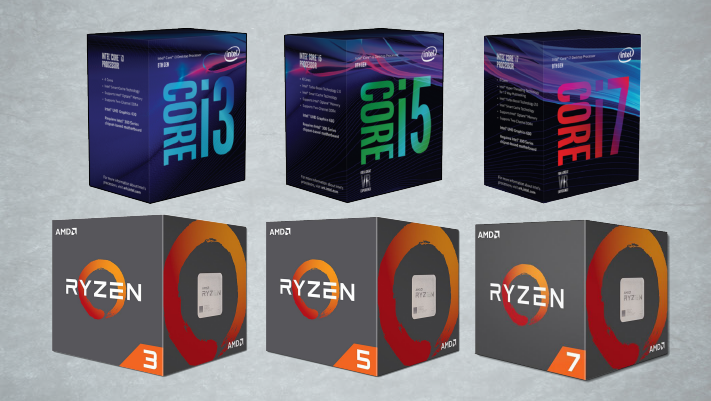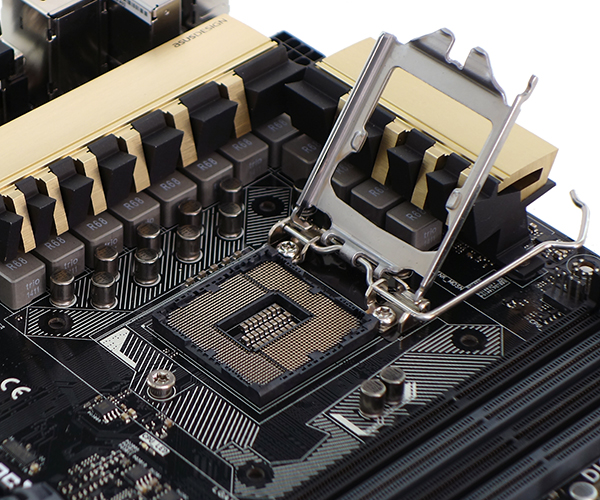How to Know What Cpu You Have
How to Buy the Correct CPU: A Guide for 2021
Choosing the all-time CPU matters a lot, whether you're upgrading your existing system or building a new PC. Higher clock speeds and core counts can make a major difference in performance, providing a snappier system, smoother gameplay and faster completion of intensive tasks such as video editing and transcoding. Plus, the CPU you lot choose will also dictate your motherboard options, equally each processor only works with a specific CPU socket and fix of chipsets.
Besides, similar most aspects of consumer tech, you'll take to decide to buy the best processor that's bachelor right at present, or wait to run into what next-generation chips bring to the table. AMD's Ryzen 5000 CPUs are impressive, finally generally overtaking competing Intel CPUs in unmarried- and multi-core performance. But due to a combination of high need, express capacity at TSMC's chip fabs and the ongoing pandemic, AMD's latest CPUs accept been very hard to notice in stock at or virtually their MSRPs since launch.
Meanwhile, Intel is about to finally movement away from a Skylake-based architecture, with Rocket Lake-South. Intel's new chips promise solid unmarried-core functioning gains of their own, as well as a sift to a platform that finally supports PCI four.0 -- a feature AMD rolled out in its Ryzen fries virtually 2 years agone.

If you already know a lot about CPU specs and want recommendations, check out our picks for best CPUs for gaming and best CPUs for workstations and the best inexpensive CPUs of 2021, tested and ranked. Nosotros also take a listing of the best chips on the market according to their CPU Benchmarks. But no affair which desktop processor you get, hither are some things to go on in mind.
TLDR:
- AMD has overtaken Intel (for now): These days, you'll often become more for less with an AMD processor, including a squeamish in-box cooler (although non with the highest-end Ryzen 7 and 9 Ryzen 5000 models) and more than cores/threads. Gaming operation has also shifted in favor of AMD for the most part, with the Ryzen v 5600X overtaking even higher-finish Intel CPUs at 1080p and stock settings. And AMD has long handled tasks similar video editing faster. Only the 1080p gaming performance edge may shift dorsum to Intel once Rocket Lake-S arrives.
- For many tasks, clock speed is more of import than core count: College clock speeds translate to snappier performance in simple, mutual tasks such equally gaming, while more cores will assist you go through fourth dimension-consuming workloads faster.
- Upkeep for a full system: Pair a strong CPU with one of the best SSDs, ample RAM and one of the best graphics cards.
AMD or Intel: Which Should You Get?
Up until 2017, AMD was the clear underdog. But with its Ryzen / Threadripper series chips, the company has moved steadily toward operation parity with Intel. And with Ryzen 5000 and fries similar the Ryzen 5 5600X in item, AMD has in most respects moved past Intel's current offerings, often delivering better performance in both light and heavy workloads that revenue enhancement many cores. The matchup may modify substantially though, once Intel'south latest Rocket Lake-Southward CPUs go far later in 2021.
All that said, both companies may very capable CPUs. Some fans will have strong opinions, merely if you lot don't take your heart assail i make or the other, yous should exist open to either. For much more than on this, see our Intel vs AMD: Who Makes the Best CPUs? characteristic.
What practise you want to do with your CPU?
It's tempting to but spend every bit much as you can afford for a CPU, but you might be better off saving some of your cash for other components. Decide your processor type and max budget based on what you lot need your reckoner to do.
- Basic tasks: $50-$100 range. If you're merely after a chip that will let yous watch video, browse the Spider web, and do bones productivity tasks like word processing and light spreadsheet work, so an entry-level chip with two or 4 cores might be just what you need. But if you oftentimes observe yourself doing more than ane of those basic tasks at one time, it would be ameliorate to footstep upwardly a model or 2. Consider a Ryzen three, like the AMD Ryzen 3 1300X or AMD Ryzen 3 2200G, or Intel Pentium on the high terminate of this price range and an Intel Celeron or chips similar AMD's Athlon 200GE on the low end.
- Gaming: $200-$300 range. If you're primarily interested in high-end gaming performance, you should opt for a mid-range Intel Core i5 or AMD Ryzen 5 CPU with loftier clock speeds. Because that the graphics card is more important for gaming than the processor, you can salvage coin by not getting a more powerful Core i7 or Ryzen 7 chip.
- Creative media work or overclocking: $300-$400 range. If you want more than cores or speed for things like video editing—or you just desire a fast, capable system with actress overhead for future computing tasks, splurge on a Ryzen seven fleck.
- Workstation muscle: $400+. If you often find yourself waiting minutes or hours for your current system to render your 3D animation or 4K video, or you're dealing with massive databases and complex math, consider an Intel Core 10 or AMD Threadripper CPU. These beasts offer massive amounts of concrete cores (up to 64 as of this writing) for extreme multitasking (ex: gaming at loftier settings while streaming and editing) or time-consuming compute tasks. Business users can consider an Intel Xeon (similar the recent Xeon W-3175X) or AMD EPYC processor, but those aren't consumer friendly--or reasonably affordable. For those not quite willing to stride up to multi-g-dollar CPUs and platforms, AMD'south 16-core Ryzen ix 5950X or 12-core Ryzen 9 5900X are both excellent alternatives that basically bring workstation-grade operation to a mainstream platform.
What generation CPU do y'all demand?

Each twelvemonth or so, Intel and AMD upgrade their processor lines with a new architecture. Intel is about to launch its "11th Gen Cadre Series," with the Core i9 11900K at the meridian end. AMD's latest fries are function of its Ryzen 5000 line, similar the AMD Ryzen v 5600X, Ryzen 7 5800X, and Ryzen 9 3900X. When looking at the model number, y'all tin encounter the generation as the first digit of the four number (ex: the eight in Core i7-8400 or the 3 in Ryzen 7 5700X). Annotation, though, that AMD skipped 4000 branding on its desktop CPUs.
How do you read the model names and numbers?
The jumble of brands and numbers that make up a CPU product proper noun can be confusing. Intel and AMD both break downwards nearly of their chips into "good, meliorate, all-time" categories, starting with Core i3/Ryzen three, stepping up to Core i5/Ryzen 5, Core i7/Ryzen vii, and Cadre i9/Ryzen 9. Intel has the Core i9-10900K at the top of its mainstream product stack, as well equally extreme/premium tier like the Core i9-10980XE, priced at effectually $one,000, just as AMD has Threadripper. But for the vast majority of users, these fries are unnecessary and well out of virtually people's price ranges.
For users on a tight budget, Intel offers its Celeron and Pentium chips (Pentium is slightly faster) while AMD has its Athlon line. On the extreme high-finish, y'all'll discover AMD'southward Threadripper and Intel's Core X series, along with the Core Ten/i9 and Xeon W (both mentioned above).
Now, what near the model numbers that come afterward the 3, 5, or 7? The first digit designates the product generation (Intel's Cadre i7-8700 is an 8th Generation Core processor, and AMD's Ryzen 5 2600 is a second Generation Ryzen processor). The rest of the numbers just mark various models in the line, with higher generally beingness better (with more cores and/or higher clocks), while a "Chiliad" at the end of an Intel chip means information technology's unlocked for overclocking. Only a handful of mainstream Intel chips are "Yard" skus, while almost all of AMD'south Ryzen processors are unlocked for overclocking (no "K" designation required). An Ten at the end of AMD model numbers means college stock clock speeds.
Should you overclock?
Overclocking, the practice of pushing a CPU to its limits by getting it to run at higher-than-specced clock speeds, is an artform that many enthusiasts savor practicing. But, if you're not in it for the claiming of seeing just how fast you lot tin can get your scrap to go without crashing, overclocking may not be worth the time or money for the boilerplate user.
In order to make your CPU achieve significantly higher clock speeds than information technology is rated for out of the box, you'll likely spend extra on an enhanced cooling organization and an overclocking-friendly motherboard. While nigh all recent AMD chips are overclockable to some extent, if yous want to dial upward an Intel chip, you'll have to pay extra for one of its K-serial processors (which don't come with coolers). By the fourth dimension y'all cistron in all these extra costs, if you're not shopping about the top of the CPU stack already, yous'd be better off budgeting another $50-$100 (£xxx-£lxx) for a CPU that comes with higher clock speeds out of the box. And think, even if you practise get all the correct equipment, you lot could still get a scrap that doesn't overclock well. Or worse if you don't know what yous're doing, y'all could damage your CPU or shorten its lifespan by pushing also much voltage through it.
What are the key CPU specs and which should I care most?
If you're looking at a spec sail for a given CPU, you'll encounter a lot of numbers. Here'due south what to look out for.
- Clock speeds: Measured in gigahertz (GHz), this is the speed at which the chip operates, so college is faster. Most modernistic CPUs adjust their clock speeds up or downwards based on the task and their temperature, so you'll see a base (minimum) clock speed and a turbo (maximum) speed listed.
- Cores: These are the processors within the processor. Modern CPUs accept between two and 64 cores, with most processors containing four to eight. Each one is capable of handling its own tasks. In most cases these days, you'll want at to the lowest degree four cores--or at least four threads (run across below).
- Threads: This is the number of independent processes a chip can handle at once, which in theory would be the same as the number of cores. Nonetheless, many processors have multithreading capability, which allows a single core to create two threads. Intel calls this Hyper-Threading and AMD calls information technology SMT (Simultaneous Multithreading). More threads means better multitasking and enhanced performance on heavily-threaded apps such as video editors and transcoders.
- TDP: The Thermal Design Profile/Power (TDP) is the maximum corporeality of heat that a chip generates (or should generate) at stock speeds, every bit measured in watts. Past knowing that--for example--the Intel Core i7-8700K has a TDP of 95 watts, y'all can make sure you take a CPU libation that can handle that amount of rut dissipation and also that your PSU can provide enough juice. Only notation that CPUs put out significantly more heat when overclocked. It's good to know what your TDP is so y'all tin can get the right cooling and power equipment to back up your CPU. Also, a higher TDP usually coincides with faster performance, although things like process node size and general architecture efficiency come into play at that place also.
- Cache: A processor's on-board cache is used to speed upward access to data and instructions between your CPU and RAM. There are three types of cache: L1 is the fastest, but cramped, L2 is roomier but slower, and L3 is spacious, but comparatively sluggish. When the data a CPU needs isn't bachelor in whatever of these places, it reaches for the RAM, which is much slower--in part because it's physically farther abroad than a CPU's on-chip cache.
You shouldn't pay too much attending to cache size, because it's hard to equate to real-world performance, and there are more than important factors to consider.
- IPC: Fifty-fifty if you lot have two CPUs that have the aforementioned clock speed and number of threads, if they're from unlike companies, or built on dissimilar architectures from the same company, they volition volition deliver different levels of IPC (instructions per clock bicycle). IPC is heavily dependent on the CPU's architecture, so chips from newer generations (ex: a Ryzen five 5600X with Zen 3versus a Ryzen 7 2700X with Zen+) will be better than older ones.
IPC is non usually listed every bit a spec and is usually measured through benchmark testing, so the best manner to learn about it is to read our CPU reviews.
What do yous need more: clock speed, cores or threads?
The answer to this question really depends on your regular computing tasks. Higher clocks translate to quicker responsiveness and program load times (though RAM and storage speed is key here every bit well). Higher clock speeds also mean unmarried-threaded tasks (like audio editing and sure older applications) tin happen faster. Many pop games are all the same lightly threaded.
But many modern programs can take advantage of lots of cores and threads. If you do lots of multitasking or edit loftier-res videos, or do other complex, fourth dimension-consuming CPU-heavy tasks, you should prioritize the number of cores. But for the vast majority of gamers and full general-purpose reckoner users, a clock speed ranging from 3-4GHz with 4 to eight cores is plenty.
What socket does my motherboard need for this CPU?

Different processors require different socket types. If you already own a motherboard and don't desire to replace it, y'all'll need to purchase a CPU that matches your board'southward socket. Alternatively, y'all need to make certain that the motherboard yous buy is uniform with your new processor.
For assist choosing a motherboard, see our 2021 motherboard ownership guide.
With its current-generation Ryzen and Athlon parts (disallowment Threadripper), AMD has adopted a single socket—AM4. That means you should, with a BIOS update, exist able to put a current-generation Ryzen chip into prvious-generation Ryzen motherboard, and vice versa. But due to limitations to the size of bachelor data stored inside BIOS chips and the vast numbers of CPUs AMD has released on AM4, this upshot has gotten much more complicated lately.
Intel, on the other hand, has a tendency in recent years not to support backward compatibility with its new chips and older motherboards, even if the socket is finer the same. For example, Intel's socket LGA 1150 and 1151 differ past a unmarried pin, and the version of 1551 designed specifically for 8th Generation Core chips is physically the same as that made for previous 6th and seventh Generation Core processors. Only those older 1151-socket motherboards don't work with newer 1151-socket CPUs, because (Intel says) the newer chips (which take more cores) accept different power delivery subsystem needs. Notation that Intel has bucked this tendency with socket LGA 1200, which will accept both 10th Gen Intel and upcoming 11th Gen intel CPUs.
Here's a list of all the contempo mainstream sockets and their respective chipsets for reference.
Socket and Chipset Table
| Intel Mainstream | Intel Mainstream | AMD Mainstream | Intel HEDT | AMD HEDT (Threadripper) | |
| Current CPU Sockets | LGA 1200 | LGA 1151 | AM4 | LGA 2066 | TR4 |
| Compatible Chipsets | Z490/Z590, H470/H570, B460/B560, H410/H510 | Z390, Z370, Z370, Q370, H370, B365, B360, H310 | X570, X470, X370, B550, B450, B350, B450, A320, X300, A300 | X299 | X399 |
Lesser Line
When choosing a CPU, first ask what you're going to do with it, then run into how much y'all can budget for it afterwards y'all've figured out how much you're spending on other components. Bank check our All-time SSDs, Best RAM, Best Graphics Cards and Best Ability Supplies guides for more details. While processors are important, in that location's no betoken in pairing a high-speed chip with weak graphics (unless you lot aren't a gamer) or a slow, spinning mechanical difficult bulldoze. While reading about specs similar clock speed and thread count is helpful, the best measure out of a processor's performance comes from objective reviews, like those we write here on Tom's Hardware.
MORE: CPU Benchmarks Hierarchy
More: All CPU Reviews
More: How to Choose a Motherboard
MORE: How to Sell Your Used PC Components
Source: https://www.tomshardware.com/reviews/cpu-buying-guide,5643.html
0 Response to "How to Know What Cpu You Have"
Post a Comment